- Home
- Gillian Flynn
The Complete Gillian Flynn Page 87
The Complete Gillian Flynn Read online
Page 87
“Did the woman look like anyone you’d seen before?”
“No. I told you.” He stepped away from the screen then, began looking over his shoulder into the living room.
“Well, I’m sorry to bother you. Maybe you should have a friend come by. Keep you company.” He shrugged again, chewed on a fingernail. “You might feel better if you get outside.”
“I don’t want to. Anyway, we have a gun.” He pointed back over his shoulder at a pistol balanced on the arm of a couch, next to a half-eaten ham sandwich. Jesus.
“You sure you should have that out, James? You don’t want to use that. Guns are very dangerous.”
“Not so dangerous. My mom doesn’t care.” He looked at me straight on for the first time. “You’re pretty. You have pretty hair.”
“Thank you.”
“I’ve got to go.”
“Okay. Be careful, James.”
“That’s what I’m doing.” He sighed purposefully and walked away from the window. A second later I heard the TV squabble on again.
There are eleven bars in Wind Gap. I went to one I didn’t know, Sensors, which must have blossomed during some flash of ’80s idiocy, judging by the neon zigzags on the wall and the mini dance floor in its center. I was drinking a bourbon and scribbling down my notes from the day when KC Law plopped down in the cushioned seat opposite me. He rattled his beer on the table between us.
“I thought reporters weren’t supposed to talk to minors without permission.” He smiled, took a gulp. James’s mother must have made a phone call.
“Reporters have to be more aggressive when the police completely shut them out of an investigation,” I said, not looking up.
“Police can’t really do their work if reporters are detailing their investigations in Chicago papers.”
This game was old. I went back to my notes, soggy from glass sweat.
“Let’s try a new approach. I’m Richard Willis.” He took another gulp, smacked his lips. “You can make your dick joke now. It works on several levels.”
“Tempting.”
“Dick as in asshole. Dick as in cop.”
“Yes, I got it.”
“And you are Camille Preaker, Wind Gap girl made good in the big city.”
“Oh, that’s me all right.”
He smiled his alarming Chiclet smile and ran a hand through his hair. No wedding ring. I wondered when I began to notice such things.
“Okay, Camille, what do you say you and I call a détente? At least for now. See how it goes. I assume I don’t need to lecture you about the Capisi boy.”
“I assume you realize there’s nothing to lecture about. Why have the police dismissed the account of the one eyewitness to the kidnapping of Natalie Keene?” I picked up my pen to show him we were on record.
“Who says we dismissed it?”
“James Capisi.”
“Ah, well, there’s a good source.” He laughed. “I’ll let you in on a little something here, Miss Preaker.” He was doing a fairly good Vickery imitation, right down to twisting an imaginary pinky ring. “We don’t let nine-year-old boys be particularly privy to an ongoing investigation one way or another. Including whether or not we believe his story.”
“Do you?”
“I can’t comment.”
“It seems that if you had a fairly detailed description of a murder suspect, you might want to let people around here know, so they can be on the lookout. But you haven’t, so I’d have to guess you’d dismissed his story.”
“Again, I can’t comment.”
“I understand Ann Nash was not sexually molested,” I continued. “Is that also the case with Natalie Keene?”
“Ms. Preaker. I just can’t comment right now.”
“Then why are you sitting here talking to me?”
“Well, first of all, I know you spent a lot of your time, probably work time, with our officer the other day, giving him your version of the discovery of Natalie’s body. I wanted to thank you.”
“My version?”
“Everyone has their own version of a memory,” he said. “For instance, you said Natalie’s eyes were open. The Broussards said they were closed.”
“I can’t comment.” I was feeling spiteful.
“I’m inclined to believe a woman who makes her living as a reporter over two elderly diner owners,” Willis said. “But I’d like to hear how positive you are.”
“Was Natalie sexually molested? Off the record.” I set down my pen.
He sat silent for a second, twirling his beer bottle.
“No.”
“I’m positive her eyes were open. But you were there.”
“I was,” he said.
“So you don’t need me for that. What’s the second thing?”
“What?”
“You said, ‘first of all …’”
“Oh, right. Well, the second reason I wanted to speak with you, to be frank—a quality it seems you’d appreciate—is that I’m desperate to talk to a nontownie.” The teeth flashed at me. “I mean, I know you’re from here. And I don’t know how you did it. I’ve been here off and on since last August and I’m going crazy. Not that Kansas City is a seething metropolis, but there’s a night life. A cultural … some culture. There’s people.”
“I’m sure you’re doing fine.”
“I’d better. I may be here for a while now.”
“Yes.” I pointed my notebook at him. “So what’s your theory, Mr. Willis?”
“That’s Detective Willis, actually.” He grinned again. I finished my drink in another swallow, began chewing on the stunted cocktail straw. “So, Camille, can I buy you a round?”
I jiggled my glass and nodded. “Bourbon straight up.”
“Nice.”
While he was at the bar, I took my ballpoint and wrote the word dick on my wrist in looping cursive. He came back with two Wild Turkeys.
“So.” He wiggled his eyebrows at me. “My proposal is that maybe we can just talk for a little bit. Like civilians? I’m really craving it. Bill Vickery isn’t exactly dying to get to know me.”
“That makes two of us.”
“Right. So, you’re from Wind Gap, and now you work for a paper in Chicago. Tribune?”
“Daily Post.”
“Don’t know that one.”
“You wouldn’t.”
“That high on it, huh?”
“It’s fine. It’s just fine.” I wasn’t in the mood to be charming, not even sure I’d remember the drill. Adora is the schmoozer in the family—even the guy who sprays for termites once a year sends doting Christmas cards.
“You’re not giving me a lot to work with here, Camille. If you want me to leave, I will.”
I didn’t, in truth. He was nice to look at, and his voice made me feel less ragged. It didn’t hurt that he didn’t belong here either.
“I’m sorry, I’m being curt. Been a rocky reentry. Writing about all this doesn’t help.”
“How long since you’ve been back?”
“Years. Eight to be precise.”
“But you still have family here.”
“Oh, yes. Fervent Wind Gapians. I think that’s the preferred term, in answer to your question earlier today.”
“Ah, thanks. I’d hate to insult the nice people around here. More than I already have. So your folks like it here?”
“Mm-hmm. They’d never dream of leaving here. Too many friends. Too perfect a house. Etcetera.”
“Both your parents were born here then?”
A table of familiar guys about my age plopped down at a nearby booth, each sloshing a pitcher of beer. I hoped they wouldn’t see me.
“My mom was. My stepdad’s from Tennessee. He moved here when they got married.”
“When was that?”
“Almost thirty years ago, I’d guess.” I tried to slow my drinking down so I didn’t outpace him.
“And your father?”
I smiled pointedly. “You raised in Kansas City?”
/>
“Yep. Never dream of leaving. Too many friends. Too perfect a house. Etcetera.”
“And being a cop there is … good?”
“You see some action. Enough so I won’t turn into Vickery. Last year I did some high-profile stuff. Murders mostly. And we got a guy who was serially assaulting women around town.”
“Rape?”
“No. He straddled them and then reached inside their mouths, scratched their throats to pieces.”
“Jesus.”
“We caught him. He was a middle-aged liquor salesman who lived with his mother, and still had tissue from the last woman’s throat under his fingernails. Ten days after the attack.”
I wasn’t clear if he was bemoaning the guy’s stupidity or his poor hygiene.
“Good.”
“And now I’m here. Smaller town, but bigger proving grounds. When Vickery first phoned us, the case wasn’t that big yet, so they sent someone mid-range on the totem pole. Me.” He smiled, almost self-effacingly. “Then it turned into a serial. They’re letting me keep the case for now—with the understanding that I’d better not screw up.”
His situation sounded familiar.
“It’s strange to get your big break based on something so horrible,” he continued. “But you must know about that—what kind of stories do you cover in Chicago?”
“I’m on the police beat, so probably the same kind of junk you see: abuse, rape, murder.” I wanted him to know I had horror stories, too. Foolish, but I indulged. “Last month it was an eighty-two-year-old man. Son killed him, then left him in a bathtub of Drano to dissolve. Guy confessed, but, of course, couldn’t come up with a reason for doing it.”
I was regretting using the word junk to describe abuse, rape, and murder. Disrespectful.
“Sounds like we’ve both seen some ugly things,” Richard said.
“Yes.” I twirled my drink, had nothing to say.
“I’m sorry.”
“Me too.”
He studied me. The bartender switched the house lights to low, an official signal of nighttime hours.
“We could catch a movie sometime.” He said it in a conciliatory tone, as if an evening at the local cineplex might make everything work out for me.
“Maybe.” I swallowed the rest of my drink. “Maybe.”
He peeled the label off the empty beer bottle next to him and smoothed it out onto the table. Messy. A sure sign he’d never worked in a bar.
“Well, Richard, thank you for the drink. I’ve got to get home.”
“It was nice talking with you, Camille. Can I walk you to your car?”
“No, I’m fine.”
“You okay to drive? I promise, I’m not being a cop.”
“I’m fine.”
“Okay. Have good dreams.”
“You too. Next time, I want something on record.”
Alan, Adora, and Amma were all gathered in the living room when I returned. The scene was startling, it was so much like the old days with Marian. Amma and my mother sat on the couch, my mother cradling Amma—in a woolen nightgown despite the heat—as she held an ice cube to her lips. My half sister stared up at me with blank contentment, then went back to playing with a glowing mahogany dinner table, exactly like the one in the next room, except that it was about four inches high.
“Nothing to worry about,” Alan said, looking up from a newspaper. “Amma’s just got the summer chills.”
I felt a shot of alarm, then annoyance: I was sinking back into old routines, about to run to the kitchen to heat some tea, just like I always did for Marian when she was sick. I was about to linger near my mother, waiting for her to put an arm around me, too. My mother and Amma said nothing. My mother didn’t even look up at me, just nuzzled Amma in closer to her, and cooed into her ear.
“We Crellins run a bit delicate,” Alan said somewhat guiltily. The doctors in Woodberry, in fact, probably saw a Crellin a week—both my mother and Alan were sincere overreactors when it came to their health. When I was a child, I remember my mother trying to prod me with ointments and oils, homemade remedies and homeopathic nonsense. I sometimes took the foul solutions, more often refused. Then Marian got sick, really sick, and Adora had more important things to do than coaxing me into swallowing wheat-germ extract. Now I had a pang: all those syrups and tablets she proffered, and I rejected. That was the last time I had her full attention as a mother. I suddenly wished I’d been easier.
The Crellins. Everyone here was a Crellin but me, I thought childishly.
“I’m sorry you’re sick, Amma,” I said.
“The pattern on the legs is wrong,” Amma whined abruptly. She held the table up to my mother, indignant.
“You’ve got such eyes, Amma,” Adora said, squinting at the miniature. “But it’s barely noticeable, baby. Only you will ever know.” She smoothed back Amma’s damp hairline.
“I can’t have it wrong,” Amma said, glaring at it. “We have to send it back. What’s the point of getting it special-made if it’s not right?”
“Darling, I promise you, you can’t even tell.” My mother patted Amma’s cheek, but she was already standing up.
“You said it would all be perfect. You promised!” Her voice wavered and tears started dripping down her face. “Now it’s ruined. The whole thing is ruined. It’s the dining room—it can’t have a table that doesn’t match. I hate it!”
“Amma …” Alan folded his paper and went to put his arms around her, but she wrenched away.
“This is all I want, it’s all I asked for, and you don’t even care that it’s wrong!” she was screaming through her tears now, a full-blown tantrum, her face mottled in anger.
“Amma, calm yourself,” Alan said coolly, trying to get a hold of her again.
“It’s all I want!” Amma yelped, and smashed the table on the floor, where it cracked into five shards. She hit it until it was in pieces, then buried her face in the sofa cushion and wailed.
“Well,” my mother said. “Looks like we’ll have to get a new one now.”
I retreated to my room, away from that horrible little girl, who was not like Marian at all. My body was heading into a flare. I paced a bit, tried to remember how to breathe right, how to calm my skin. But it blared at me. Sometimes my scars have a mind of their own.
I am a cutter, you see. Also a snipper, a slicer, a carver, a jabber. I am a very special case. I have a purpose. My skin, you see, screams. It’s covered with words—cook, cupcake, kitty, curls—as if a knife-wielding first-grader learned to write on my flesh. I sometimes, but only sometimes, laugh. Getting out of the bath and seeing, out of the corner of my eye, down the side of a leg: baby-doll. Pulling on a sweater and, in a flash of my wrist: harmful. Why these words? Thousands of hours of therapy have yielded a few ideas from the good doctors. They are often feminine, in a Dick and Jane, pink vs. puppy dog tails sort of way. Or they’re flat-out negative. Number of synonyms for anxious carved in my skin: eleven. The one thing I know for sure is that at the time, it was crucial to see these letters on me, and not just see them, but feel them. Burning on my left hip: petticoat.
And near it, my first word, slashed on an anxious summer day at age thirteen: wicked. I woke up that morning, hot and bored, worried about the hours ahead. How do you keep safe when your whole day is as wide and empty as the sky? Anything could happen. I remember feeling that word, heavy and slightly sticky across my pubic bone. My mother’s steak knife. Cutting like a child along red imaginary lines. Cleaning myself. Digging in deeper. Cleaning myself. Pouring bleach over the knife and sneaking through the kitchen to return it. Wicked. Relief. The rest of the day, I spent ministering to my wound. Dig into the curves of W with an alcohol-soaked Q-tip. Pet my cheek until the sting went away. Lotion. Bandage. Repeat.
The problem started long before that, of course. Problems always start long before you really, really see them. I was nine and copying, with a thick polka-dotted pencil, the entire Little House on the Prairie series word by word into spiral
notebooks with glowing green covers.
I was ten and writing every other word my teacher said on my jeans in blue ballpoint. I washed them, guiltily, secretly, in my bathroom sink with baby shampoo. The words smudged and blurred, left indigo hieroglyphics up and down the pant legs, as if a tiny ink-stained bird had hopped across them.
By eleven, I was compulsively writing down everything anyone said to me in a tiny blue notepad, a mini reporter already. Every phrase had to be captured on paper or it wasn’t real, it slipped away. I’d see the words hanging in midair—Camille, pass the milk—and anxiety coiled up in me as they began to fade, like jet exhaust. Writing them down, though, I had them. No worries that they’d become extinct. I was a lingual conservationist. I was the class freak, a tight, nervous eighth-grader frenziedly copying down phrases (“Mr. Feeney is totally gay,” “Jamie Dobson is ugly,” “They never have chocolate milk”) with a keenness bordering on the religious.
Marian died on my thirteenth birthday. I woke up, padded down the hall to say hello—always the first thing I did—and found her, eyes open, blanket pulled up to her chin. I remember not being that surprised. She’d been dying for as long as I could remember.
That summer, other things happened. I became quite suddenly, unmistakably beautiful. It could have fallen either way. Marian was the confirmed beauty: big blue eyes, tiny nose, perfect pointy chin. My features changed by the day, as if clouds floated above me casting flattering or sickly shadows on my face. But once it was settled—and we all seemed to realize it that summer, the same summer I first found blood speckling my thighs, the same summer I began compulsively, furiously masturbating—I was hooked. I was taken with myself, an incredible flirt in any mirror I could find. Unabashed as a colt. And people loved me. I was no longer the pity case (with, how weird, the dead sister). I was the pretty girl (with, how sad, the dead sister). And so I was popular.
It was that summer, too, that I began the cutting, and was almost as devoted to it as to my newfound loveliness. I adored tending to myself, wiping a shallow red pool of my blood away with a damp washcloth to magically reveal, just above my naval: queasy. Applying alcohol with dabs of a cottonball, wispy shreds sticking to the bloody lines of: perky. I had a dirty streak my senior year, which I later rectified. A few quick cuts and cunt becomes can’t, cock turns into back, clit transforms to a very unlikely cat, the l and i turned into a teetering capital A.

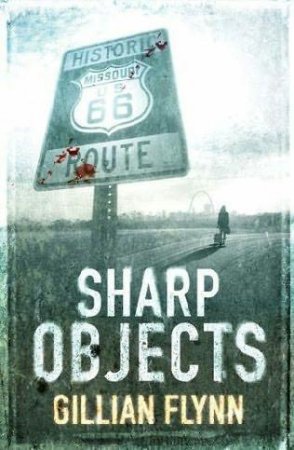 Sharp Objects
Sharp Objects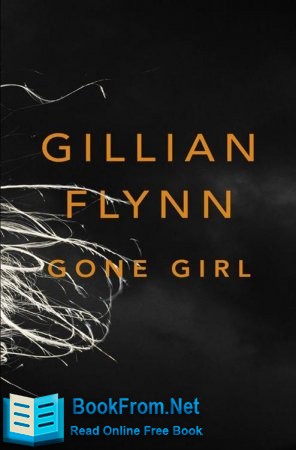 Gone Girl
Gone Girl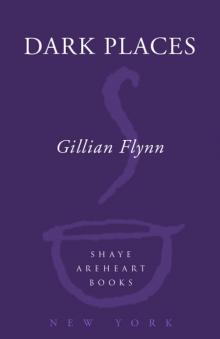 Dark Places
Dark Places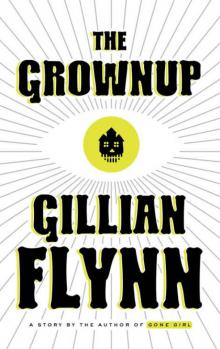 The Grownup
The Grownup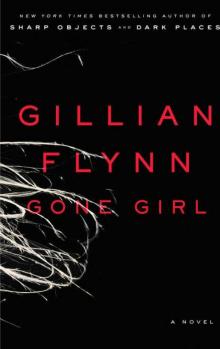 Gone Girl: A Novel
Gone Girl: A Novel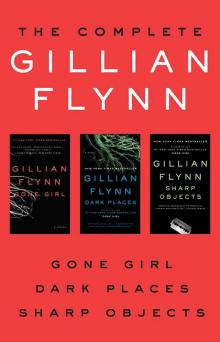 The Complete Gillian Flynn
The Complete Gillian Flynn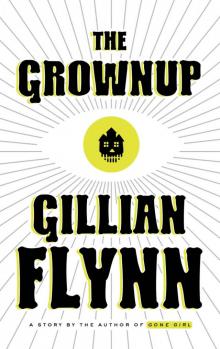 The Grownup: A Story by the Author of Gone Girl (Kindle Single)
The Grownup: A Story by the Author of Gone Girl (Kindle Single)